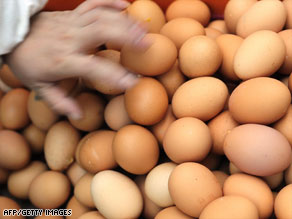BEIJING, China (CNN) — Consumers in Beijing’s malls and shops are shunning the milk and poultry sections — for good reasons.

Poultry products, including eggs, may be contaminated with melamine through animal food.
They are shocked and scared by the news headlines: some food produced in China is tainted with melamine.
“Of course I’m worried,” says a woman shopping in Nanxiaojie Market. Stop eating eggs? “That’s not possible,” she tells CNN. “If there’s a problem with eggs, it should be solved fundamentally.”
Chinese premier Wen Jiabao says China will take steps to win back consumers.
“We will use our actions and high quality of our food products to win the trust and confidence of Chinese people and people around the world,” he told reporters at the end of a two-day summit of Asian and European leaders in Beijing last weekend. ![]() Watch more about the tainted food scandal »
Watch more about the tainted food scandal »
“Three minister-level officials have resigned and a government investigation is going on. Whoever is responsible must be brought to justice. We need to protect the Made in China brand,” said Chinese analyst Victor Gao.
But the problem could be more pervasive. The state-run Nanfang Daily published an investigative story saying that adding melamine into animal feed has become an “open secret.”
The report said adding melamine into feed started in the aquatic farming industry five years ago, as a way of faking higher protein levels. ![]() Learn more about chemical melamine »
Learn more about chemical melamine »
It then spread into other agro-industries such as poultry. Even more shocking is the allegation that the melamine added is from industrial waste material.
CNN contacted the Ministry of Agriculture about the story, but got no immediate response.
Two years ago, reports revealed pet food exported from China to the United States was spiked with melamine and had sickened and killed dogs.
Several weeks ago, the food scandal spread to milk, biscuits and candies. Now, it is tainted eggs. So far, no illnesses or deaths have been linked to eggs.
Tests in Hong Kong last week showed eggs exported by a Chinese company are contaminated with excessive levels of melamine.
In recent days three other brands of eggs have also been found to contain the chemical.
Small wonder egg sales at the Xinfadi, a wholesale market in Beijing, dropped by 10 percent this week, according to the state-run China Daily.
Chinese officials say the source of the problem is melamine, an industrial chemical used to produce plastics and fertilizer. Melamine is high in nitrogen.
Unscrupulous milk suppliers would water down milk and spike it with melamine — but in amounts that allowed it to still pass quality tests.
Agriculture experts speculate that eggs tainted with melamine may be the result of tainted feed given to hens. That begs the question: if melamine was in the animal feed, will it make into the meat, and into consumers’ bodies?
Ingesting melamine in large doses over an extended period of time could cause kidney stones and other illnesses, agriculture and health experts say.
But taking in a small amount of melamine poses no such danger. “If it’s taken over a long period of time, maybe, but if it’s ingested only for short period of time it does not pose harm on animals,” says He Jiguo, a professor of food science and nutrition at the China Agriculture University.
He says the animals that end up being slaughtered do not live that long and do not actually ingest enough melamine for it to build up in their systems.
The dogs and cats that were sickened in the United States were probably eating treats and meals tainted with melamine over a long period of time, he explains.
Until the situation is resolved, worried grocery shoppers in Beijing say they’ll just have to eat fewer eggs and more bean-products, like soybeans.
updated 1:47 p.m. EDT, Fri October 31, 2008
Source: CNN